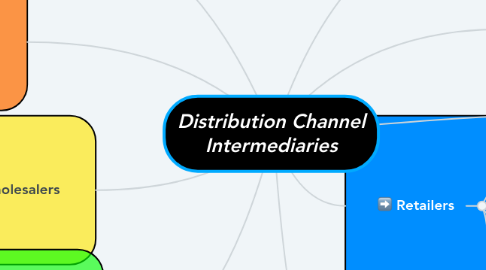Distribution Channel Intermediaries
von Tanveen AbdulSalam

1. A Middlemen
1.1. is anybody acting as an intermediary between the manufacturer and consumer
1.2. Middlemen, also referred to as intermediaries, play a vital part in ensuring that the distribution channel between the producer and the consumer is complete.
1.3. Examples of middlemen include wholesalers, retailers, agents and brokers
2. Agents
2.1. The agent as a marketing intermediary is an independent individual or company whose main function is to act as the primary selling arm of the producer and represent the producer to users
2.2. For Example: travel agents, insurance agents and the organisers of party-based selling events of Tupperware.
3. Wholesalers
3.1. Wholesalers are independently owned firms that take title to the merchandise they handle. In other words, the wholesalers own the products they sell.
3.2. Examples of wholesalers include: Christmas-tree wholesalers who buy from growers and sell to retail outlets. Restaurant food suppliers. Clothing wholesalers who sell to retailers.
4. Distributors
4.1. Distributors only carry complementary product lines, either Pepsi or Coke products. Distributors usually maintain close relationships with their suppliers and customers.
4.2. Distributors will take title to products and store them until they are sold. However, they often sell onto the end customer rather than a retailer.
4.3. Distributors and dealers are often involved in providing after-sales service.
4.4. eg- building supplies,electrical components,industrial clothing etc
5. The four basic types of marketing intermediaries are agents, wholesalers, distributors and retailers.
6. Marketing intermediaries are also known as middlemen or distribution intermediaries who form an important part of the product distribution channel.
7. The people and the organisations that assist in the flow of goods and services from manufacturer to consumer are known as marketing intermediaries.
8. Retailers
8.1. The retailer will sell the products directly to the end user for a profit
8.2. Retailers can have independently owned and operated stores like small “mom and pop” stores, or they can be part of a large chain,Aditya Birla’s More Mega Stores
8.3. examples of retailing are traditional brick-and-mortar stores. These include giants such as Best Buy, Wal-Mart, and Target.
9. Industrial channels
9.1. Industrial channels are usually shorter than consumer channels
9.2. Direct selling is prevalent due to close relationship between the manufacturer and the customer, as well as due to the nature of the product sold.


